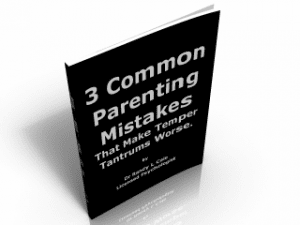 Young children often are easily upset by minor circumstances. Perhaps they break a toy, store or can’t watch their favorite program, or have to leave the playground before they’re ready. These and other everyday situations can give rise to sadness, whining, and crying. Of course, some circumstances warrant an emotional response, for example, if another child takes their toy or a peer treats them unfairly or harshly. Children may react emotionally in many situations; what’s important is whether the intensity of the response is appropriate.
Young children often are easily upset by minor circumstances. Perhaps they break a toy, store or can’t watch their favorite program, or have to leave the playground before they’re ready. These and other everyday situations can give rise to sadness, whining, and crying. Of course, some circumstances warrant an emotional response, for example, if another child takes their toy or a peer treats them unfairly or harshly. Children may react emotionally in many situations; what’s important is whether the intensity of the response is appropriate.
As overly sensitive children get older, parents often see more extreme, melodramatic outbursts that continue for an extended time. In school, such outbursts elicit negative attention and impede their ability to get along. Extreme reactions to relatively minor events often lead to interventions by parents and teachers. It may seem necessary to respond to these outbursts to help the child calm down. However, as the child gets older, the outbursts seem to increase rather than decrease, and parents spend more and more time trying to calm the child. This solution is actually the problem.
- Sally is a divorced mom with a seven-year-old daughter, Kara. Sally sought counseling because her daughter is frequently upset when she comes home from school, full of complaints about her teacher and her peers. When she visits her father, she spends the first few hours after the visit crying and upset. Whenever Kara starts to talk about problems at school, or about her father, or the divorce, Sally hugs her and sits down for an extended conversation. They’ve been doing this for four years.
- Kara is now “upset” in a rather extreme fashion 6 to 10 times a week, and the conversations have gotten longer and longer. Her complaints about her father have become so exaggerated that her mother is starting to discount them. When Sally talked to me about the situation, her eyes filled with tears. She expressed tremendous guilt over putting her daughter through a divorce and acknowledged her desire to relieve any distress Kara might feel about her life.
 Unfortunately, Sally’s solution is actually the problem. She’s been overprotective and over-sensitized to her daughter’s distress. She’s reacted every single time, trying to soothe her daughter, so Kara has never had the opportunity to resolve her own emotional upsets. She’s never learned that she can be upset, tearful, or angry and that these feelings will pass without her mom’s intervention. Her inability to resolve her own difficulties leaves her emotionally disabled. Sally needs to let Kara learn this key skill.
Unfortunately, Sally’s solution is actually the problem. She’s been overprotective and over-sensitized to her daughter’s distress. She’s reacted every single time, trying to soothe her daughter, so Kara has never had the opportunity to resolve her own emotional upsets. She’s never learned that she can be upset, tearful, or angry and that these feelings will pass without her mom’s intervention. Her inability to resolve her own difficulties leaves her emotionally disabled. Sally needs to let Kara learn this key skill.
A second factor is involved in this situation: Kara has learned that being sad and upset pulls adults into her life. She gets attention for being unhappy. If you’ve read the materials on this website, you know that whatever behavior consistently gets parents’ attention will grow. So now Kara lives in a world of hurt and negative emotions because that’s how she’s learned to get love. As she gets older and her personality begins to solidify, this pattern of negative emotions will create major challenges in her life.
Dr. Cale’s Special Report 3 Common Parenting Mistakes That Make Temper Tantrums Worse
** Please double-check for accuracy. Your privacy is SAFE. We will NEVER sell/rent/give away your information.
Three Simple Guidelines To A More Confident Child
If you follow the three simple guidelines below, you’ll be helping your children develop emotional strength and a sense of confidence in their ability to handle their own lives.
1. Have Faith In Your Children’s Ability To Handle Their Lives.
Whether children are in an intact or divorced family, are healthy or in some way handicapped or disabled, there’s no reason to teach them that their lives are in any way “less than” what they should be. If you label their lives as sad or unfortunate, they’ll believe you. If you feel this way, you may become overprotective. Kids who are overprotected lack the confidence to handle their own emotions or deal with difficult situations. If you don’t have faith in them, where will they get it? Do you think you can hide that from them? Once you realize that your lack of trust in their abilities is their biggest enemy, then you realize it’s essential that you find this faith…so you pass it on to them. How? You…
2. Explain To Your Children That They Can Handle Their Emotions.
When everyone is calm, talk to your children about the things that upset them. Offer some solutions and help solve the problems. After you have a couple of these conversations, tell them that you’ve given them the information they need to handle their own emotions. Explain that you’re not going to run to their rescue anymore or try to calm them when they’re upset. Tell them that the feelings they have may be painful, but they’ll go away. Let them know that you have confidence in their ability to cope. And most importantly, you decide to…
3. Never Rescue Your Children.
 When your children become upset and it’s part of their pattern, allow them to whine, complain, cry, have a tantrum. Don’t get angry, upset, or tearful, and don’t get into a conversation about the upset. Just be patient and let them handle it. As soon as they show signs of calming down, engage them in normal conversation about other events or activities. Don’t talk about whatever it was that upset them. If they start to get upset again, disengage.
When your children become upset and it’s part of their pattern, allow them to whine, complain, cry, have a tantrum. Don’t get angry, upset, or tearful, and don’t get into a conversation about the upset. Just be patient and let them handle it. As soon as they show signs of calming down, engage them in normal conversation about other events or activities. Don’t talk about whatever it was that upset them. If they start to get upset again, disengage.
Remember: what you consistently give your attention to…it must grow.
If you consistently give your attention to patterns of whining, complaining, and “sensitivity”…you will find that you nurture a child who seems to choose these unhealthy patterns over and over.
Why? Because you…as the most important teacher…keep investing in those patterns.
Thus, to start nurturing confidence, you simply need to get out of the way, and allow your kids to realize that the world will not rescue them from their upsets… their whining… their crying… their meltdowns… they’re placing too much importance on the actions/words of others.
If you follow these simple guidelines, I’m confident that your children will respond within two to three weeks… .maybe longer if you struggle in your own ability to disengage these “signals” of sensitivity.
Their behavior will change radically as they begin to develop a greater sense of confidence in themselves. Dependent, immature behavior will fall by the wayside if you permit them to tap their own strength and abilities.
You can nurture inner strength and personal confidence by the way you respond to their behavior and emotions. If you are committed to nurturing a confident child, you may want to consider The Confident Child program available on CD, or by downloading the audio file. You can get access to this information RIGHT NOW by – Clicking Here.
The Confident Child: Nurturing Healthy Self-Esteem
As always, I encourage you to research your options carefully. Then, when you decide what’s right for you and your family, put it to the test. The only way to test, however, is when you have a VERY CLEAR PLAN, and IT’S A REALISTIC PLAN.
With each of the Terrific Parenting Solutions, you will be guided through a plan that YOU CAN TRUST. These carefully developed programs take advantage of hundreds of hours of clinical research, followed by years of application and testing by real-life families.
I hope you take advantage of this remarkable information, as these simple ideas can FREE YOUR CHILDREN of years of needless anxiety, discomfort, and sadness. While not a substitute for counseling or therapy (most kids don’t need that!), kids need to learn how to use their good brain to get through the difficult stuff quickly, and then to find ways to expand and deepen their positive and healthy experiences.















